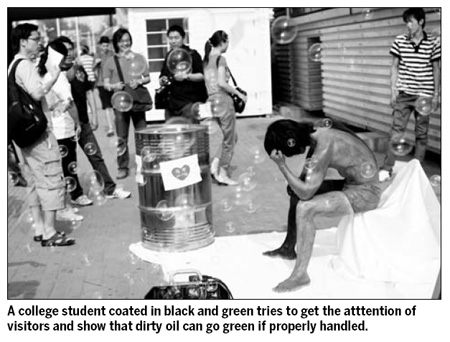Clean results from the oil and dirt
Many may find hogwash oil smelly and disgusting, but students from Beijing Forestry University are looking at developing a clean business from the used oil from restaurants.
|
|
|
Two college students from Beijing Forestry University show their soaps made from hogwash oil at Wudaokou subway station. [China Daily] |
The students, from the university's environmental society, Green Finger, have found a way to turn the swill-cooked oil into soap and are urging more restaurants to donate used oil.
"We are now heating the oil to 50C; you may find it smells like fried fish because it was used for that purpose," said Liu Meichen, the group's leader, as she explained how to turn the oil into soap.
Liu, with 20 students mostly majoring in environment engineering, showed the process to the public near the Wudaokou subway station on Saturday, World Environment Day.
Heating the oil is step one. Sodium hydroxide and water is added and the mixture is stirred for 30 minutes. It's then poured into containers and left for three or four days until it turns solid.
"The ratio of oil, water and sodium hydroxide is 227:101:37," said Liu, who learned saponification - the process of converting fat into soap - at the university.
Liu, who is studying environmental engineering, hadn't figured out how to combine her major with her interest in protecting the environment until a scandal regarding hogwash oil broke in March.

A China Youth Daily report said two to three million tons of the dirty oil, soaked with poisonous carcinogens, have sneaked back to dining tables through an underground muck-money network.
"Hogwash oil, with an annual consumption of several million tons, has been an ingrained problem in China for the past 20 years," Hu Xiaosong, vice-dean at the College of Food Science and Nutritional Engineering, China Agricultural University, said in a report. He said it is an open secret in the industry.
Restaurants normally have liters of oil, used in various cooking processes, left at the end of a day. By law, the oil has to be treated for safe recycling by licensed operators, but it is often sold to middlemen who in turn sell them directly to smaller restaurants.
Tests have shown the oil may jeopardize health and contribute to causing some cancers. As a result, laws have been introduced to ban it from the market.
This stomach-turning news inspired Liu and her group. They said the oil will destroy white blood cells and mucous membrane in the digestive system. If the oil goes into rivers, it will cause pollution.
The students acted immediately. They first turned to dinning halls at their universities, asking for the leftover oils.
"We've asked for about 5 kg of oil from them," said Wang Junzhu, a Green Finger member.
While Green Finger had strong support from the university, public restaurants had a different reaction.
"We've contacted six restaurants near our university, but half of them refused our request," Wang said. Many didn't even want to hear the students out when they mentioned "hogwash oil" because hogwash oil is a very sensitive issue.
Green Finger said it plans to collect dirty oil from restaurants and return it to them in the form of soap. The students hope to get advertising on the soap packages so they can make the project sustainable.
The team is taking part in the Lenovo 2010 Youth Social Entrepreneurship Competition, joining about 16,000 teams from all over China.
But persuading more restaurants to give up their profits from selling used oils is still Green Finger's biggest problem.
Xue Wen, who works for a Donglaishun restaurant in Wudaokou, has promised to donate some oil after being intrigued by the demonstration.
Xue said his restaurant sells 20 to 25 kg of used oils every 10 to 15 days for 3.6 yuan per kg.
"I think I can give the students 1.5 kg for free if they want."
He said he has no idea what the buyer does after he buys the oil.
 0
0 



![CTwo college students from Beijing Forestry University show their soaps made from hogwash oil at Wudaokou subway station. [China Daily] CTwo college students from Beijing Forestry University show their soaps made from hogwash oil at Wudaokou subway station. [China Daily]](http://images.china.cn/attachement/jpg/site1007/20100607/00114320f5750d768fa304.jpg)




Go to Forum >>0 Comments